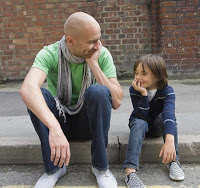Teach Your Parents Well
And you, of tender years,
Can’t know the fears that your elders grew by,
And so please help them with your youth,
They seek the truth before they can die.
Teach your parents well,
Their children’s hell will slowly go by,
And feed them on your dreams
The one they picked, the one you’ll know by.
Don’t you ever ask them why, if they told you, you would cry,
So just look at them and sigh and know they love you.
– Graham Nash, Crosby, Stills and Nash
When my younger daughter was in Junior High, I arranged to work the early shift so that I could be home with her after school. She had yet to move into the sulky, door-slamming, leave-me-alone stage of the later teen years and was still content to sit down with me over a snack and discuss every nuance of her day from the perpetual odd smell in the school auditorium to what the cool girls wore to class. But that’s not all we shared. For an hour each afternoon we would settle on the couch, our legs intertwined under a pile of blankets and cats, with a big bowl of popcorn and huge mugs of hot chocolate, to watch The Gilmore Girls.
My daughter could imagine herself as the sweet and ever popular Rory, and she could wish that I would be her strong, yet laid-back single mother. I, too, wished I could be Lorelai, and I hoped for that perfect daughter who never got a tattoo, who got over every heartache in an episode, and who wanted to be best friends with her mother. We fell into frequent disagreement over how our TV surrogates handled their relationship, as well as life in general. But, there was one thing my daughter and I did agreed on. A central theme of Rory’s character was that wherever she went, she was always reading a book. We both thought this was pretty cool.
An Australian author recently compiled a list of every book that Rory read or referenced throughout the entire 7 seasons of Gilmore Girls. It came to an impressive 339 books, ranging from Beowulf to the Bhagava Gita. On hearing about the compilation, my daughter and I decided that, in the spirit of Rory and Lorelai, we would read our way through the entire book list. Not to be left out, my older daughter has joined the effort.
The first book we are tackling is George Orwell’s 1984. As soon as I started re-reading this dystopian classic, I had to resist the urge to call my daughters and start lecturing them on post WWII economics, the Cold War, and the 1950’s American culture during which 1984 was written. I was assuming my children could not possibly understand the story or its implications without this context.
However, I wisely chose to hold my mother-knows-all tongue. I realized that all readers approach each story from their personal context. Despite the facts that the words are fixed on the page and the author may have a specific message, all stories are understood from the reader’s unique point of view. Once I acknowledged this, I became excited to see these books through my daughters’ eyes.
My daughters are not only a different generation from me, but they differ as much in personality and life experiences from each other as they do from me. While bonding over this experience and delighting in the chance to share great literature, I realize that ultimately this will be three unique perceptions. We will interpret all the books through our own lenses. We will bring our own life adventures to the stories, and take from the stories what we need and want.
On further reflection, I also came to the realization that our culture is more youth-driven that most others, and though we Baby Boomers are responsible for many current problems from pollution to social security, it is much less our world, and much more that of our children. If anyone wants to argue this with me, let me point out that the number of ‘news’ reports on Miley’s twerking easily rivaled the Crimean coup.
I have reached an age where I can feel relief at handing over the responsibility. But, we elders still need to find a way to live in this world. It is time for our children to teach us what it means to live in this contemporary society and how to navigate in it. They need to explain the technology (with a minimum of eye rolling, if we’re lucky), they need to remind us what it is to feel passion driven, and they need to show us how they are capable of making positive changes to this new world of theirs. Wise though we are (and hopefully still of some value), we need to trust that our children are able and willing to show us the way.
The switch from preacher to parishioner has been subtle for me, but it is accelerating as age allows me the grace to let go of the feeling that I have to be the most knowledgeable, the most right. With my willing abdication, I find it easier to argue less, preach less, and listen more. I can accept that I know less of this world than my children. I hope they can accept that I might still know a thing or two.
So, bring it on, Moliere and Mailer, Nietsche and Nafisi. We will read you and analyze your words and disagree over the meaning of it all. And through the experience, we will teach each other well.
